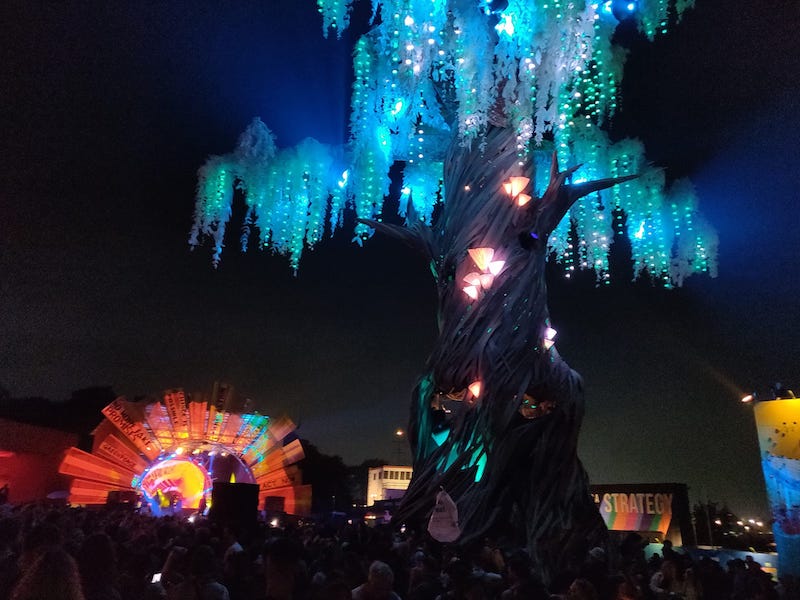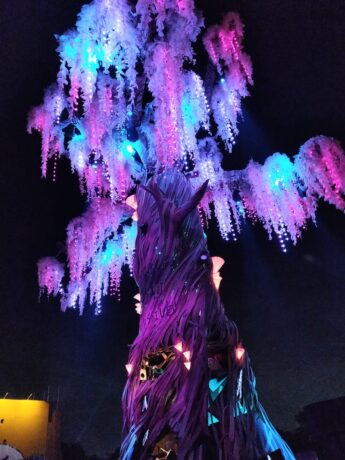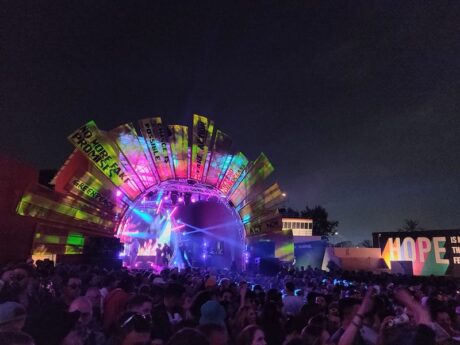
“Anyone who plants a tree has not lived in vain,” according to an ancient African proverb. The unknown philosopher who shared this insight was not alone. Ever since traditions have been recorded, virtually every culture in every corner of the earth has treasured these “poems written in the sky” as symbols of wisdom, peace, and unity.
These virtues were reflected in the Rave Tree in the Glastonbury Festival’s Greenpeace area. Like all trees, this one, which stood in the center of the Greenpeace field, had a story of its own to share with all who came to admire it.
“The Rave Tree was the main focus of our Glastonbury offering,” said Bailes+Light’s Benji Bailes, who served as lighting director and director of creative technology for Greenpeace. “It boasts a canopy made of 1,250 LED pixel lights woven amongst chandeliers of recycled plastic, and an arrangement of spots. Each year we further develop the ‘eco-system’ within the tree, with artists on our team creating illuminated bracket fungi and mycelium/mycorrhizal light installations within the trunk, so we can tell a story about symbiosis within nature.”

With a color palette based on the seasons—greens for spring, rich yellows and oranges for summer, deep reds for autumn and blues, whites and purples for winter—the Rave Tree evoked the reassuring cycle of nature. A collection of 15 Maverick Storm 1 Spot and four Storm 1 Wash fixtures helped this seasonal progression unfold as they illuminated the Rave Tree.
“Sustainability is a key consideration for our area of the festival,” said Bailes. “We’ve done a lot of work in reducing power consumption across all areas, and as we’ve built our entertainment offering and increased our lighting package. It’s clear that now, we can only use LED lighting fixtures.”
Describing Glastonbury as “a tough environment to work in,” Bailes noted, “Even when it isn’t raining there is often deep mud and splashing to contend with. Our field is highly bespoke and the waterproofing across the stage areas is not always as we would like it, so using IP fixtures is a must. We wouldn’t be able to achieve the same level of production with non-IP fixtures.”
The Greenpeace Area also featured the Sun Stage for pop, folk, and electronic artists. Supporting their performances were five Maverick Storm 1 Spot fixtures, and a video wall made up of F4 IP video panels, deftly used by Show LD Belinda Best to reflect the distinct personalities and styles of each act.
 “We switched between bands on our Sun Stage, and DJs at the Rave Tree,” said Bailes. “Festivals generally have a lot of work to do when it comes to gender equality across stages, but our entire Friday lineup consisted of only female and non-binary artists. We’ve also continued to make huge inroads with gender inclusivity on our own production team. Across lighting we’re now made up of over 50% women, the remainder being male and non-binary folk. Being balanced in this way has a huge impact on the team culture and productivity and makes it a pleasant place for all to work.”
“We switched between bands on our Sun Stage, and DJs at the Rave Tree,” said Bailes. “Festivals generally have a lot of work to do when it comes to gender equality across stages, but our entire Friday lineup consisted of only female and non-binary artists. We’ve also continued to make huge inroads with gender inclusivity on our own production team. Across lighting we’re now made up of over 50% women, the remainder being male and non-binary folk. Being balanced in this way has a huge impact on the team culture and productivity and makes it a pleasant place for all to work.”
On Thursday night, after two days of working the festival, this diverse crew came together for a dance. The location, they chose was under the Rave Tree.


